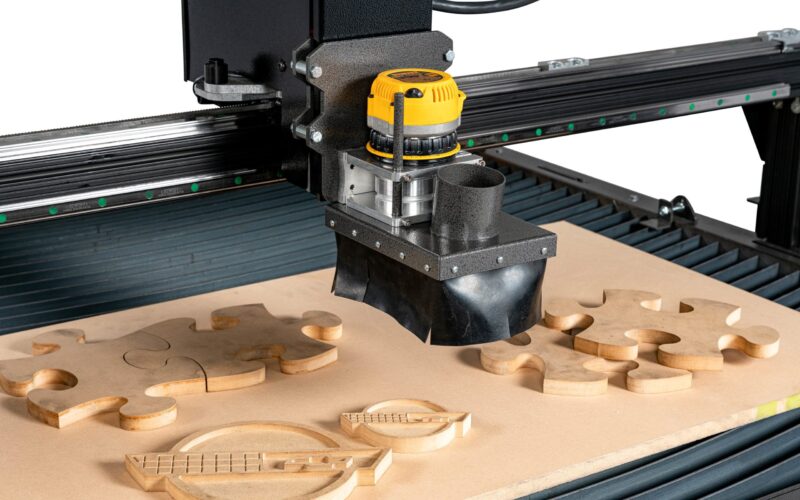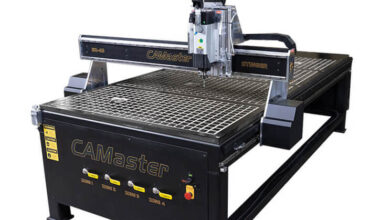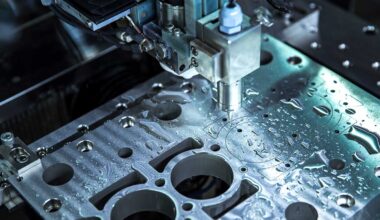Introduction
In the realm of modern manufacturing and hobbyist crafting, CNC (Computer Numerical Control) machines have revolutionized the way we create and design. Among these, desktop CNC machines and tabletop CNC routers stand out for their versatility, affordability, and ease of use. Whether you’re a professional looking to add precision to your workshop or an enthusiast keen on exploring CNC machining, this guide will provide a comprehensive overview of these incredible tools.
What is a Desktop CNC Machine?
Definition and Overview
A desktop CNC machine is a compact, computer-controlled device used for cutting, milling, engraving, and drilling various materials. Unlike industrial CNC machines, desktop versions are smaller, more affordable, and designed to fit on a workbench or desktop. They bring the precision and capabilities of larger CNC machines to a more accessible and user-friendly format.
Key Features
- Compact Size: Ideal for small spaces.
- Precision: High accuracy and repeatability.
- Versatility: Can work with a range of materials including wood, plastic, and metal.
- Ease of Use: Often come with user-friendly software.
Understanding Tabletop CNC Routers
What is a Tabletop CNC Router?
A tabletop CNC router is a type of CNC machine specifically designed for routing tasks, such as cutting, engraving, and shaping materials. These routers are compact enough to fit on a table or workbench, making them perfect for hobbyists and small businesses.
Primary Uses
- Woodworking: Creating intricate designs and shapes.
- Prototyping: Developing models and prototypes with precision.
- Engraving: Adding detailed engravings on various materials.
- Sign Making: Crafting custom signs with precision cuts.
Comparing Desktop CNC Machines and Tabletop CNC Routers
Similarities
- Size: Both are designed to fit in smaller workspaces.
- Portability: Can be easily moved and set up.
- Control: Operated via computer control for precision tasks.
- Materials: Can work with similar materials like wood, plastic, and metal.
Differences
- Functionality: Desktop CNC router are more versatile, capable of milling, drilling, and cutting, while tabletop CNC routers are primarily focused on routing and engraving.
- Complexity: Desktop CNC machines often have more complex capabilities and can handle a wider variety of tasks.
- Specialization: Tabletop CNC routers are more specialized for tasks like woodworking and sign making.
Advantages of Desktop CNC Machines
Precision and Accuracy
Desktop CNC machines provide exceptional precision and accuracy, essential for intricate designs and detailed work. This makes them invaluable for applications requiring tight tolerances and high-quality finishes.
Versatility
These machines can handle a wide range of materials and tasks, from milling and drilling to engraving. This versatility makes them suitable for various industries, including jewelry making, model building, and electronics.
Cost-Effective
Desktop CNC machines are more affordable than their industrial counterparts, making them accessible to small businesses, hobbyists, and educational institutions. They offer a high return on investment by increasing productivity and reducing material waste.
User-Friendly Software
Most desktop CNC machines come with intuitive software that allows users to create and modify designs easily. This software often includes libraries of pre-made designs and tutorials, making it easier for beginners to get started.
Benefits of Tabletop CNC Routers
Space Efficiency
Tabletop CNC routers are designed to maximize workspace efficiency. Their compact size allows them to fit on a standard workbench, making them ideal for small workshops and home use.
Ease of Use
These routers are generally easy to set up and operate, with many models offering plug-and-play capabilities. This user-friendliness makes them an excellent choice for beginners and hobbyists.
Specialized Routing Capabilities
Tabletop CNC routers excel at routing tasks, providing clean cuts and detailed engravings. They are particularly useful for woodworking projects, where precision and detail are crucial.
Affordable Entry Point
For those looking to enter the world of CNC machining, tabletop CNC routers offer an affordable starting point. They provide the necessary features and capabilities without the higher cost associated with larger machines.
Applications of Desktop CNC Machines and Tabletop CNC Routers
Desktop CNC Machines
- Jewelry Making: Crafting intricate designs and custom pieces with high precision.
- Prototyping: Creating detailed prototypes for product development.
- Education: Teaching students about CNC machining and manufacturing processes.
- Model Building: Constructing detailed models for architecture, engineering, and hobbies.
Tabletop CNC Routers
- Woodworking: Crafting furniture, cabinetry, and decorative items.
- Sign Making: Producing custom signs with intricate designs and lettering.
- Hobby Crafting: Creating custom projects and crafts.
- Small Business Production: Manufacturing small-scale products and custom orders.
Choosing the Right CNC Machine for Your Needs
Consider Your Requirements
When selecting between a desktop CNC machine and a tabletop CNC router, consider your specific needs and the types of projects you plan to undertake. If you require a versatile machine capable of handling a variety of tasks, a desktop CNC machine might be the best choice. For specialized routing and engraving, a tabletop CNC router would be more suitable.
Budget and Space
Evaluate your budget and available workspace. Desktop CNC machines tend to be more expensive but offer broader capabilities. Tabletop CNC routers are more affordable and space-efficient, making them ideal for smaller workshops or home use.
Software and Support
Check the software compatibility and the level of support offered by the manufacturer. User-friendly software and good customer support can significantly enhance your CNC machining experience, especially if you are new to the technology.
Setting Up Your CNC Machine
Workspace Preparation
Ensure you have a clean, well-ventilated workspace with enough room for your CNC machine and related tools. A sturdy workbench is essential to support the machine and ensure stability during operation.
Machine Installation
Follow the manufacturer’s instructions for assembling and installing your CNC machine. This usually involves setting up the machine, connecting it to a computer, and installing the necessary software.
Calibration and Testing
Calibrate your CNC machine according to the manufacturer’s guidelines to ensure accurate operation. Perform test runs on scrap materials to familiarize yourself with the machine’s capabilities and settings.
Tips for Successful CNC Machining
Start with Simple Projects
Begin with straightforward projects to build your confidence and understanding of the machine. Gradually progress to more complex tasks as you gain experience.
Maintain Your Machine
Regular maintenance is crucial for the longevity and performance of your CNC machine. Keep it clean, lubricate moving parts, and check for wear and tear regularly.
Utilize Online Resources
Take advantage of online tutorials, forums, and communities to enhance your skills and troubleshoot any issues you encounter. Many CNC enthusiasts share their knowledge and experiences, providing valuable insights and tips.
Conclusion
Desktop CNC machines and tabletop CNC routers are powerful tools that can significantly enhance your crafting and manufacturing capabilities. By understanding their features, benefits, and applications, you can choose the right machine for your needs and embark on a journey of precision and creativity. Whether you’re a professional, a hobbyist, or an educator, these versatile machines offer endless possibilities for innovation and artistry.
Further Reading and Resources
- Manufacturer Websites: Visit the websites of CNC machine manufacturers for detailed product information and support.
- Online Communities: Join CNC forums and social media groups to connect with other users and share knowledge.
- Tutorials and Courses: Enroll in online courses or watch tutorial videos to improve your CNC machining skills.
- Books and Guides: Explore books and guides on CNC machining for in-depth knowledge and advanced techniques.
By leveraging these resources and investing in the right CNC machine, you can unlock your full creative potential and achieve outstanding results in your projects.




